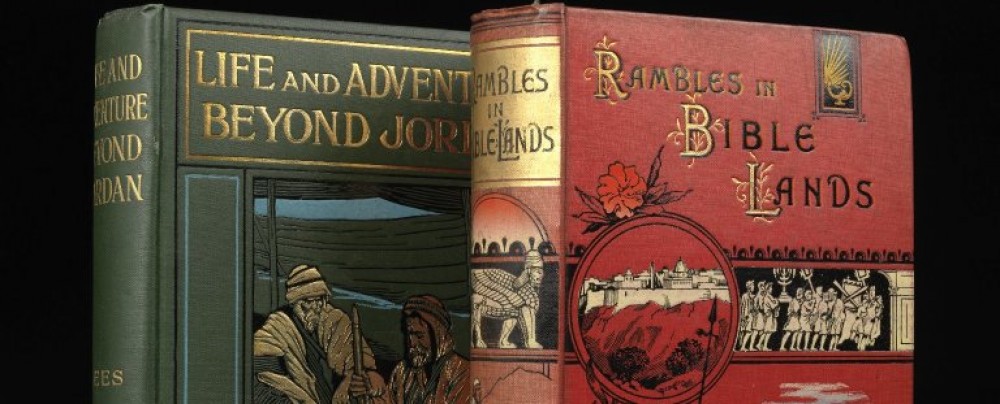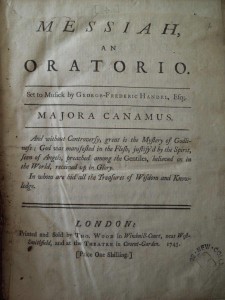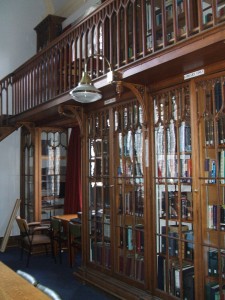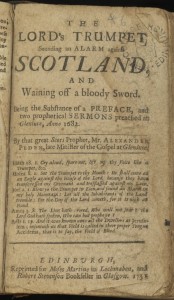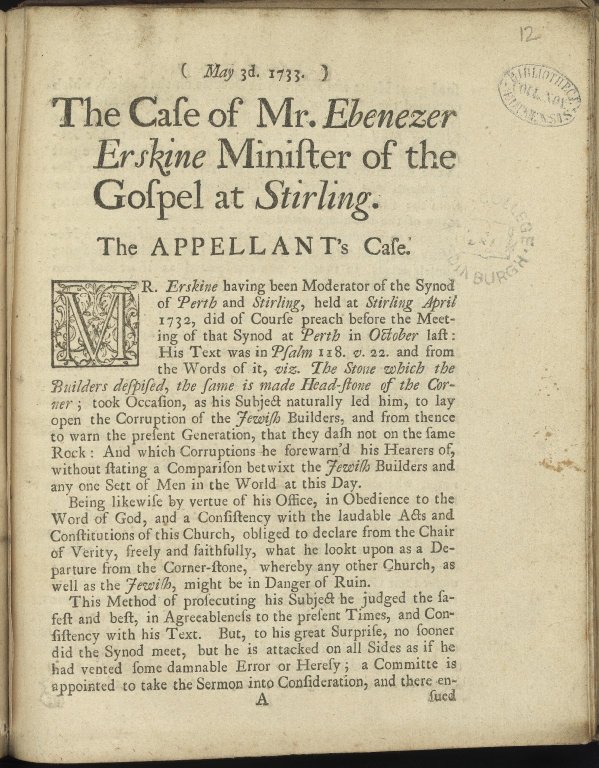It’s not every day that you find a rare edition of Handel’s Messiah in your library but I’m delighted to say that we have one at New College Library! This recently catalogued pamphlet from our Special Collections appears to be the first printing in England, and second edition overall of the libretto of Handel’s Messiah (The first edition was in Dublin.) It is also the first edition printed in England by six years. According to Elizabeth Lawrence, EUL Assistant Rare Books Librarian, “The oratorio was first performed in Dublin in 1742, and then again in London in March 1743. The publication we have, the libretto, known as the ‘word book’, was published to sell at the theatre, so the audience had half an idea what was going on. There are no copies of this edition currently on ESTC.”
Tag Archives: Pamphlets
Aberdeen Connections #RBSCG14
Last week I was privileged to attend the CILIP Rare Books and Special Collections conference at the Sir Duncan Rice Library at Aberdeen University. I was able to take a poster about the Funk Donation Projects at New College Library, which fitted well with the theme of buildings and refurbishment projects for Special Collections.
I began the conference with a visit I’d arranged to Christ’s College Library, Aberdeen, thanks to the College Administrator, a New College alumnus. In the course of the Centre for World Christianity Library project that I’ve been working on over the summer, I’ve come across a number of books marked Christ’s College Library Aberdeen, so I was keen to see this Divinity library. The last remaining departmental Library at the University of Aberdeen, it’s supported by the Church of Scotland to provide books for undergraduate students of Divinity. The beautiful nineteenth century library environment also provides a setting for seminars and events for Christ’s College, which has a historic role overseeing the preparation and support of candidates for the ministry of the Church of Scotland. Recently it has developed a new Centre for Ministry Studies. I took the opportunity to visit Kings College Chapel, where I realized that the war memorial stained glass window was designed by Sir Douglas Strachan, who designed the windows in the Free High Kirk building which is now New College Library.
The conference included a visit to the University of Aberdeen’s Special Collections, where we were treated to a fabulous display of treasures, including an illuminated Dutch Book of Hours from the early 15th century that I could have looked at all afternoon. The background to the donors of many of the items on display and the complex library history of the two colleges, Kings and Marischal had been aptly descibed that morning by Dr Iain Beavan. I was fascinated to hear from after Conference Dinner speaker Prof Peter Davidson that another of the treasures on display, the Aberdeen Bestiary, was once posted out to M.R.James as part of his work cataloguing the Aberdeen University manuscripts. Other days, other ways …
I had learned before coming to the University of Aberdeen about their Pamphlets collection, which has a relationship with the newly catalogued Pamphlets Collection at New College, Edinburgh. Following the Union of the United Presbyterian Church with the Free Church of Scotland in 1900, the United Presbyterian College Library was dispersed among the three Free Church Colleges (including New College), and the pamphlet volumes were part of the collection that came to the Free Church College in Aberdeen (now Christ’s College). The older part of Christ’s College Library was deposited in Aberdeen University Library in 1986.
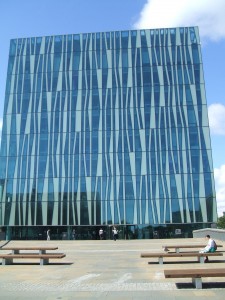 A tour of the newly built Sir Duncan Rice Library showed the importance of donor support for the Library project, with every area and room of the library named after a donor or supporter. I met Mrs Janet MacKay, Information Consultant for Divinity, History and Philosophy in the Elsevier Information Consultants Room for a helpful chat about the similarities and differences in our roles. I’d been struck by the Subject Information point desks on each floor of the Sir Duncan Rice Library, and also by the balance of bookstock vs study spaces / PCs in this library. Shared themes were supporting PhD students and the continued importance of the printed book to Divinity.
A tour of the newly built Sir Duncan Rice Library showed the importance of donor support for the Library project, with every area and room of the library named after a donor or supporter. I met Mrs Janet MacKay, Information Consultant for Divinity, History and Philosophy in the Elsevier Information Consultants Room for a helpful chat about the similarities and differences in our roles. I’d been struck by the Subject Information point desks on each floor of the Sir Duncan Rice Library, and also by the balance of bookstock vs study spaces / PCs in this library. Shared themes were supporting PhD students and the continued importance of the printed book to Divinity.
Christine Love-Rodgers, Academic Support Librarian – Divinity
Past Politics : Pamphlets from an independent Scotland
New College Library’s Pamphlets Collection of over 30,000 items captures the issues and debates from the seventeenth century onwards. Now on display in the New College Library entrance are just a few of the pamphlets that take up the debate over the Treaty of Union that was agreed between the two separate countries on 22 July 1706. This led to the Union with England Act, passed in 1 May 1707, by the Parliament of Scotland.
All these items were catalogued as part of the Funk Donation Projects, supported by the generous donation of Rev. Dr Robert Funk. 
Hodges, James
The rights and interests of the two British monarchies inquir’d into and clear’d : with a special respect to an united or separate state. Treatise I. Shewing the different nature of an incorporating and federal union ; the reasons why all designs of union have hitherto prov’d unsuccessful ; and the inconsistency of an union by incorporation with the rights, liberties, national interests, and publick good of both kingdoms. Edinburgh : Re-printed by John Reid for James Donaldson, and are to be sold at the Caledonia Coffee-House, 1703.
New College Library W.d. 1/7
Defoe, Daniel
An essay at removing national prejudices against a union with Scotland : to be continued. Part I. Edinburgh : [s.n.], 1706. Published anonymously by Daniel Defoe.
New College Library W.d 1/4
Anon
The smoaking flax unquenchable : where the union betwixt the two kingdoms is dissecated, anatomized, confuted and anuuled. Also that good form and fabrick of civil gobernment, intended and espoused by the true subjects of the land, is illustrated and held out.
[Edinburgh : s.n.], Printed in the year 1706.
New College Library W.d. 1/15
Christine Love-Rodgers, Academic Support Librarian – Divinity
Scotland’s Religious Past : Unique Special Collections at New College Library, Edinburgh
Here at New College Library we’re rediscovering unique Special Collections items which tell the story of Scotland’s radical religious past.
This item, The Lord’s trumpet sounding an alarm against Scotland, and waining off a
bloody sword, reprints sermons originally preached in 1682 by Alexander Peden, one of the leading figures of the Covenanter movement in Scotland. Part of the New College Library Pamphlets Collection, it was identified when catalogued as unique on ESTC, or the English Short Title Catalogue, meaning that this imprint had never previously been identified.
The story of Scotland’s religious history is also evident in this eighteenth century pamphlet by Ralph Erskine, brother of Ebenezer Erskine, leader of the Secession Church which broke away from the Church of Scotland in the eighteenth century. Samuel VII and covenant theology. Faith’s Plea Upon God’s Word and Covenant is another example of a New College Library Pamphlet that has been identified as unique in the world.
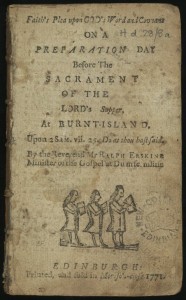
Faith’s plea upon God’s word and covenant : a sermon preached on a preparation-day before dispensing the sacrament of the Lord’s Supper, at Burnt-island ..
New College Library, H.d.288
Both these items were catalogued as part of the Funk Cataloguing Projects at New College Library, University of Edinburgh, where over 700 items unique on ESTC have been discovered.
Christine Love-Rodgers, Academic Support Librarian – Divinity
The Case of Mr. Ebenezer Erskine, founder of the Secession church in Scotland
Ebenezer Erskine (1680–1754), a founder of the Secession church, died in Stirling on 2 June 1754. A celebrated preacher, his opposition to patronage, when a local landowner could choose the parish minister without the approval of the people of the parish, set him against the established Church of Scotland. In 1733 Erskine joined other Scottish ministers to form the Associate Presbytery, remaining in active ministry in Stirling. By 1742 the number of seceder congregations in Scotland had grown to twenty.
New College Library holds this pamphlet from 1733, recently catalogued online as part of the Funk Cataloguing Projects, which is typical of Erskine’s sermons published during the controversial times of the early 1730s. New College Library also holds Erskine’s manuscript notebooks in the archives.
Sources
David C. Lachman, ‘Erskine, Ebenezer (1680–1754)’, Oxford Dictionary of National Biography, Oxford University Press, 2004 [http://www.oxforddnb.com/view/article/8853, accessed 27 May 2013]
The Rescue that never was – remembering Holocaust Memorial Day #HMD2013
![Nazi massacres of the Jews & others : some practical proposals for immediate rescue made by the Archbishop of Canterbury and Lord Rochester in speeches on March 23rd 1943 in the House of Lords /William Temple. London : Victor Gollancz, [1943] Z.h.30/24](http://libraryblogs.is.ed.ac.uk/newcollegelibrarian/files/2012/12/6-nov-010.jpg?w=225)
Nazi massacres of the Jews & others : some practical proposals for immediate rescue made by the Archbishop of Canterbury and Lord Rochester in speeches on March 23rd 1943 in the House of Lords /William Temple. London : Victor Gollancz, [1943] Z.h.30/24
New College Library holds this pamphlet, Nazi massacres of the Jews & others : some practical proposals for immediate rescue made by the Archbishop of Canterbury and Lord Rochester in speeches on March 23rd 1943 in the House of Lords. The author, William Temple (1881-1944) was a bishop in the Church of England who served as Archbishop of York Archbishop of Canterbury between 1942–44.
One of the founders of the Council of Christians and Jews in 1942, Temple was at the forefront of the Church of England’s campaign to draw attention to the plight of the Jews in Europe and to demand that the British Government provide rescue and sanctuary for Jewish victims. His speech urges:
“The Jews are being slaughtered at the rate of tens of thousands a day on many days … we cannot rest as long as there is any sense among us that we are not doing all that might be done.”
Sadly no changes to refugee policy were made by the British Government and after William Temple died in 1944, the impetus for rescuing the Jews did not continue.
This item is part of the Pamphlets Collection, and it was catalogued as part of the Funk Cataloguing Projects at New College Library
The wood-walls of Scotland : a Christmas Carol
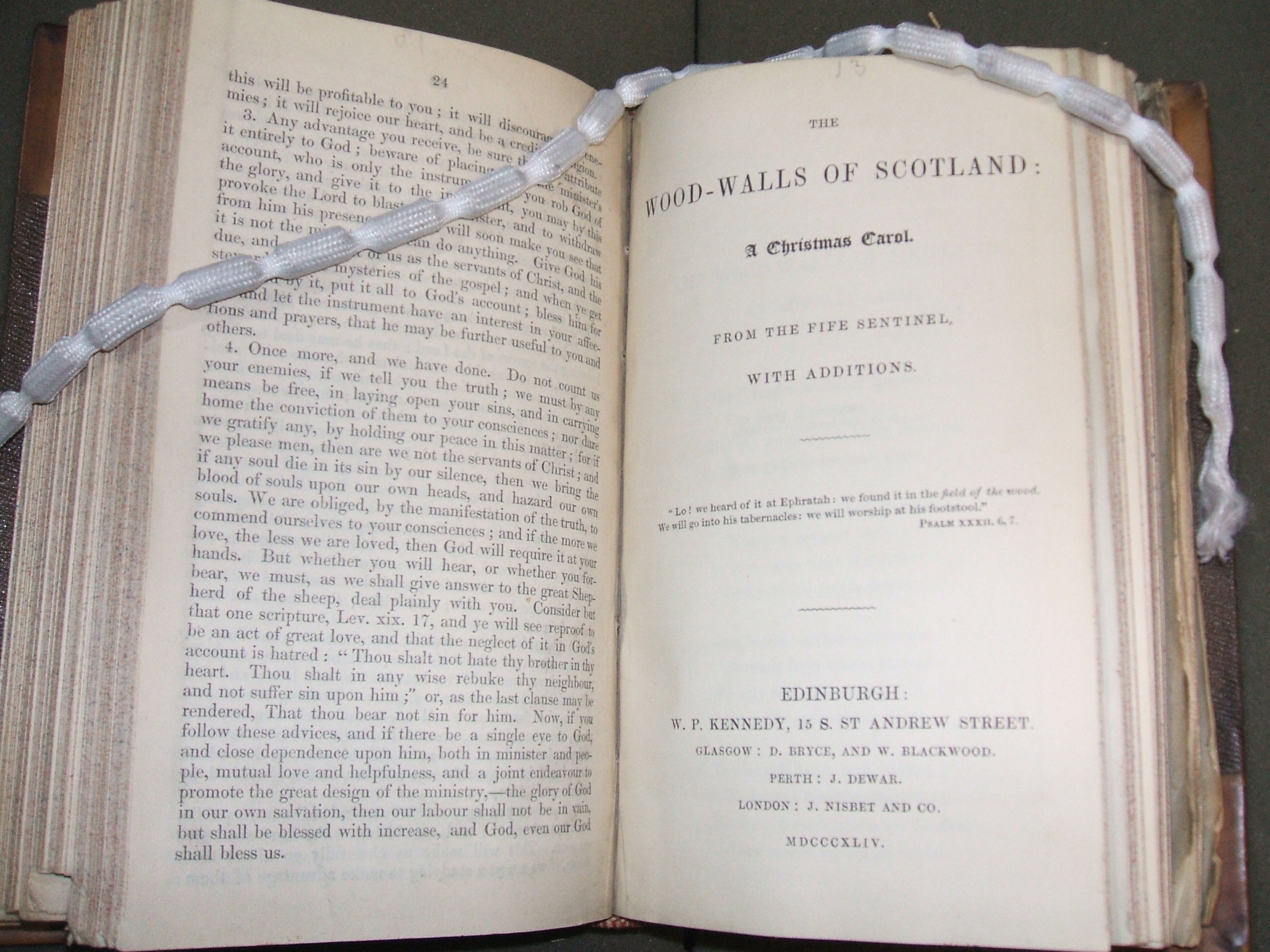
The wood-walls of Scotland : a Christmas carol, from the Fife Sentinel, with additions. Edinburgh : W. P. Kennedy … etc., 1844. New College Library F.a.12/13
New College Christmas Carol Service is taking place today at 5pm in the Martin Hall, led by members of the New College community and with singing from the New College Choir. Here’s a Christmas carol from New College Library’s collections.
This pamphlet, The wood-walls of Scotland, was originally published in the newspaper the Fife Sentinel. It contains a carol that would have been sung to a popular hymn tune, inspired by the verse from Psalm 132 “Lo, we heard of it at Ephratah: we found it in the fields of the wood.” Published after the Disruption of 1843, the carol is celebrating the outdoor services held to accommodate congregations who had separated to form the new Free Church of Scotland.
“On hill-side and green valley
Our wooden temples placed
The faithful, round they rally
The Gospel-standard rais’d”
Remembering the life of Guru Nanak
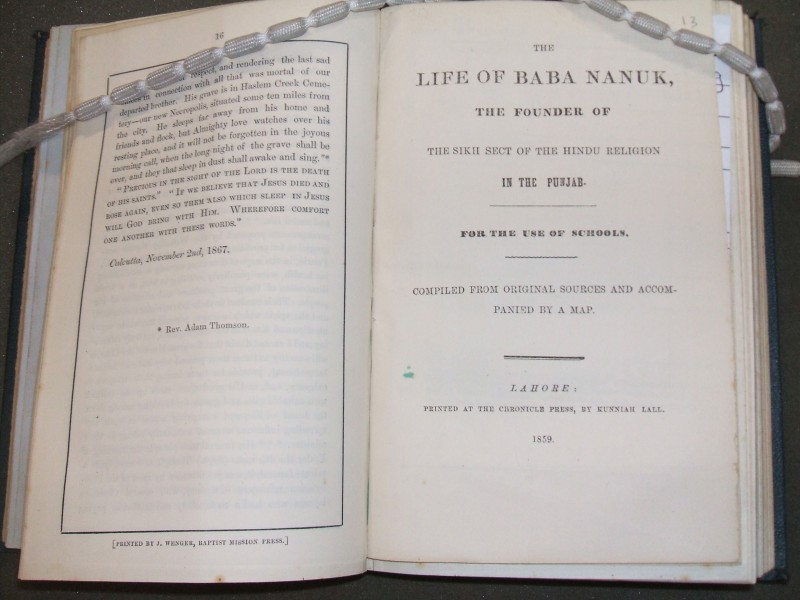
The life of Baba Nanuk, the founder of the Sikh sect of the Hindu religion in the Punjab : for the use of schools : compiled from original sources and accompanied by a map. Lahore : The Chronicle Press, by Kunniah Lall, 1859. New College Library P.g.21.13/2
Sikhs around the world will celebrate the birthday of Guru Nanak on Wednesday 28 November. Guru Nanak (1469-1539) was the founder of the Sikh religion.
The life of Baba Nanuk, from New College Library’s Pamphlets collection aims to give an introduction for schools to Sikhism’s founder and the early history of the religion. New College is the only library in Scotland to hold a copy of this work.
This item was catalogued as part of the Funk Cataloguing Projects at New College Library.
Keeping the faith in wartime
A short New College Act of Remembrance will take place on Friday 9th November at 1pm at the War Memorial in the corridor leading to the Assembly Hall.
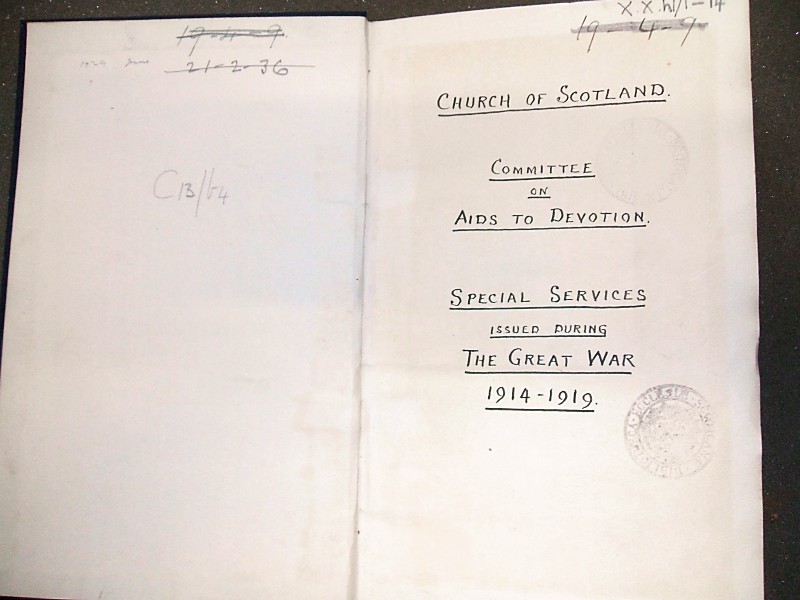
Church of Scotland – Committee on Aids to Devotion. Special Services issued during the Great War 1914-1919. New College Library Pamphlets Collection X.X.h.1.1-14
This item from New College Library’s Pamphlets Collections was recently catalogued as part of the Funk Cataloguing Projects. It is a collection of Church orders of services and guides for public prayer in a family or school setting. All the pamphlets date from the First World War Period, ending with a form of Divine service for Remembrance Day on the eleventh of November.The pamphlets and their binding are flimsy and utilitarian but their content bears witness to the cost of war for those at home as well as those out on the front.
Pamphlet X.X.h. 1/2 Form of prayer for schools in time of war, includes the text:
“Throw the shield of Thy protection over all who have gone forth to fight our battles by land or sea or air. We especially remember those near and dear to ourselves.”
A puzzle of Presbyterian history
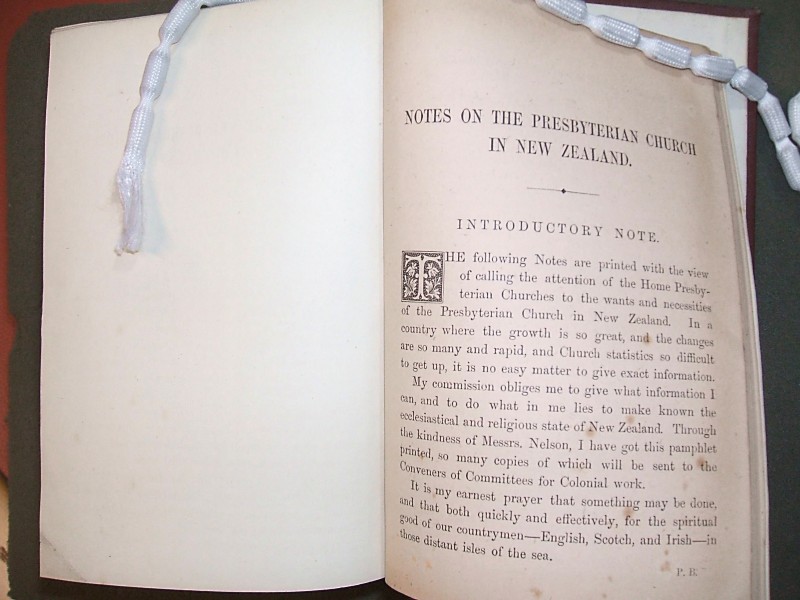
Notes on the Presbyterian church in New Zealand. By P. B., fl. ca 1860. New College Library – Special Collections. P.f.14/24
Today the School of Divinity welcomes Dr Hugh Morrison, a visiting Fellow from Otago, who is speaking at the World Christianity Research Seminar on “Doing religious history ‘down under:’ challenges and opportunities in the New Zealand context.”
A recent challenge for the the Funk Cataloguing Projects here at New College Library was this nineteenth century pamphlet, “Notes on the Presbyterian Church in New Zealand”. Little is known about this item or its author, P.B. From clues within the pamphlet we have garnered that the writer was active in the 1860s and the item was probably published in Scotland.
The union catalogue of UK research libraries, COPAC, lists New College Library as the only known location in the UK for this pamphlet
